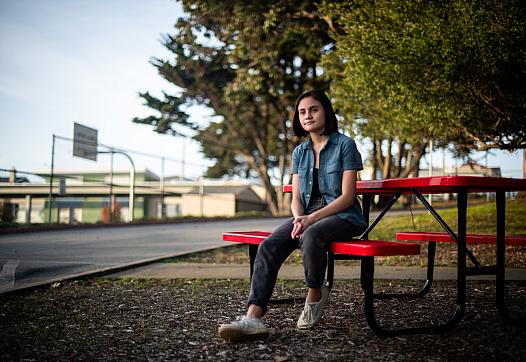Part 1: Lowell Students Say #MeToo. Sexual Abuse Allegations Spark Reckoning at SF High School
The story was originally published in KQED with support from the USC Annenberg Center for Health Journalism’s 2021 Impact Fellowship.
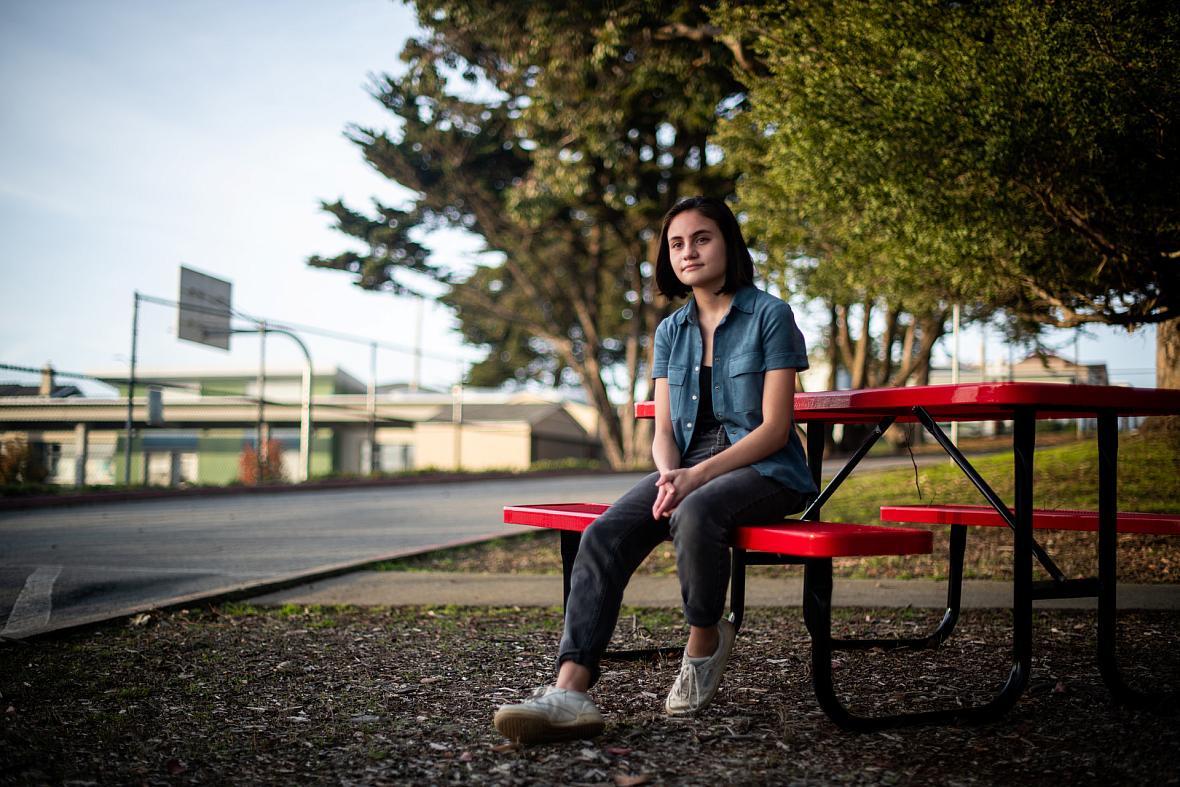
Justine Orgel poses for a portrait at Lowell High School in San Francisco on Jan. 9, 2020.
(Beth LaBerge/KQED)
CHJ · Lowell Students Push for Cultural Shift in How Schools Respond to Sexual Abuse
Jessica Weiss, a 24-year-old Wall Street analyst, was scrolling through Twitter on a break while working from home in New York this summer when she saw the smiling image of a former Lowell High School classmate, Raymond Lang. She was shocked as she read through the growing series of posts accusing him of rape and other sexual abuse.
At the time, Lang, 25, was facing felony rape and other criminal charges in Alameda County related to one of those allegations, the violent assault of a woman he’d met via an online dating app in 2018. He’d later accept a plea deal that dismissed all but the less serious charge of assault with a deadly weapon — with the sentence deferred over a five-year probation term.
Efforts to reach Lang for comment were not successful.
Weiss didn’t know it at the time, but those posts would help trigger a new reckoning in the #MeToo movement focused in part on San Francisco’s prestigious Lowell High School. The effort empowered current and former students to call for systemic change while curating and promoting allegations on social media.
I think a lot of me wanting to speak out about this comes from just guilt of being silent back then.
Jessica Weiss, 2014 Lowell High School graduate
Advocates and survivors nationwide had spontaneously created accounts over the summer to share hundreds of stories of abuse experienced while they were in high school. Many of the people behind these grassroots efforts say the COVID-19 pandemic left them with more time and space to reflect on trauma they had experienced as teenagers. And remote learning added a sense of security, separating students from alleged abusers.
Painful Memories From High School
Weiss, who graduated from Lowell in 2014, said seeing her former classmate publicly accused pushed her and others in her Lowell alumni community to reckon with painful memories from high school.
She said a different Lowell alum, Hiromi Fujita, sexually harassed her in high school, and she’d heard other allegations about him from several friends.
“I think a lot of me wanting to speak out about this comes from just guilt of being silent back then,” Weiss said.
She eventually connected with three other women who anonymously posted allegations on June 7 that Fujita had abused or assaulted them in high school and college, prompting another woman to come forward with a similar story.
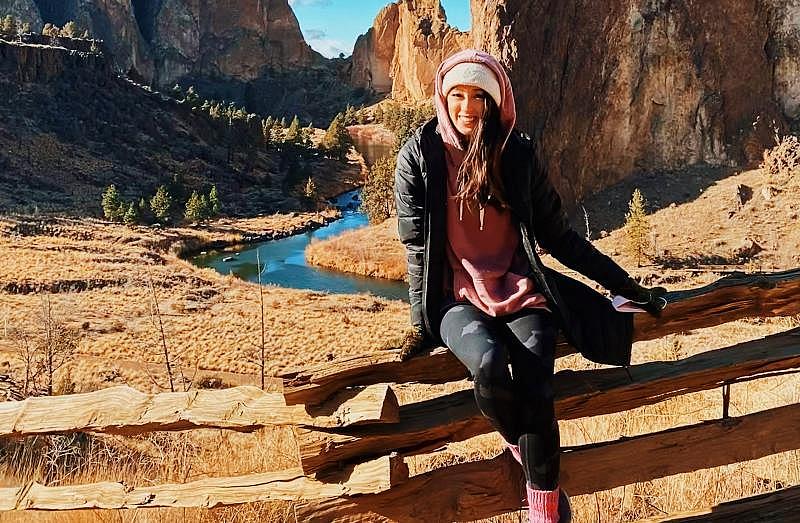
Jessica Weiss, who graduated from Lowell High School in 2014, says a social media post last summer about a former classmate brought back painful memories. (Courtesy of Jessica Weiss)
A total of nine former Lowell students told KQED that he was abusive or inappropriate to young women when he was in high school and college.
Two former students said they saw Fujita assault a female classmate on school grounds.
But Fujita, who graduated in 2013, was popular with administrators and students. He was on the football team, involved in student government and close to the dean and principal, according to several former students.
The school district declined to comment on specific allegations against Fujita, and Lowell Principal Dacotah Swett said the school couldn't locate records of any reported incidents.
When asked about the allegations, Ray Cordoba, the dean of Lowell while Fujita was a student, said, “Any reports of assault are reported and dealt with accordingly.”
Fujita did not respond to multiple requests for comment, but he appears to have tweeted an apparent response the day the posts about him went up: “Sexual assault is not okay. The fact is that I was and have been part of the problem, especially by not speaking out for my bad actions sooner. I have sought counseling and therapy for a lot of my issues, such as control and anger.”
One woman, who graduated from Lowell in 2014, spoke on the condition of anonymity over fears that she or her family may be physically harmed in retaliation. She said Fujita sexually assaulted her in his car when she was a junior, and she felt waves of anxiety for years just seeing cars that looked like his.
Sharing her experience on social media made her feel less alone.
“I almost felt relieved. Maybe there was no real reason to be scared,” she said. “Hopefully we can head towards a future where we don't have to call someone out because it's normal now to not rape and assault people. And I hate that it has to come to this. But I think these changes need to happen.”
More Students Speak Out
Several alumni who spoke with KQED said the elite reputation of Lowell contributed to an environment where students did not trust administrators to take their allegations seriously.
“We are a top-tier public school in the state of California. We exist in progressive, liberal San Francisco. That definitely led to a culture where students who experience these issues weren't comfortable coming forward,” Weiss said. “We were a school that was very concerned with reputation.”
Hours after the allegations against Fujita were posted, more alumni began posting about their experiences at Lowell. Shavonne Hines-Foster, a senior at Lowell, said that soon opened the floodgates for current San Francisco students to speak out on Twitter and Instagram.
“That served as a catalyst for everything else,” she said. “Students came forward about their experiences with racism, sexual assault, harassment and mental health at Lowell.”
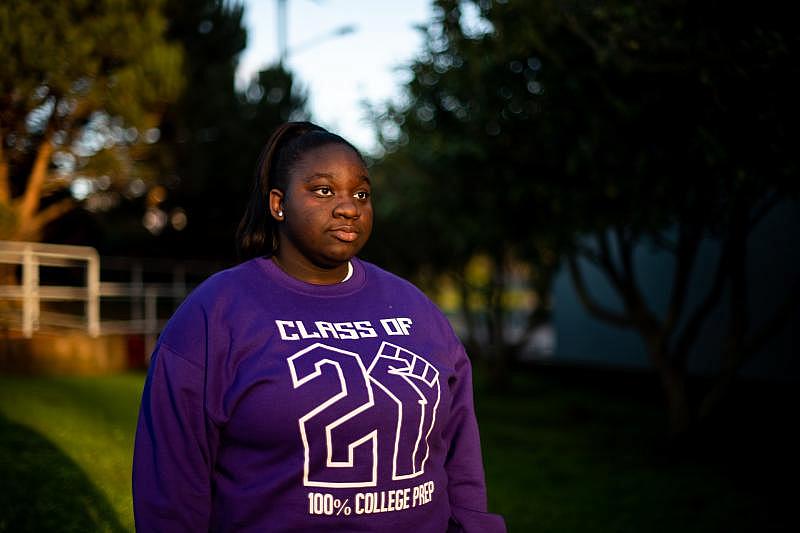
Shavonne Hines-Foster poses for a photo at Lowell High School in San Francisco on Jan. 29, 2021. (Beth LaBerge/KQED)
At least four current San Francisco students, 12 alumni, two teachers and a former dean have been accused online of sexual misconduct since the summer. Hines-Foster used her Instagram account to share and amplify students' stories, and her role as a San Francisco Unified School District student delegate to bring these posts to the district’s attention.
Lowell Principal Swett said she reached out to students who posted online when possible, and also offered students who had faced allegations counseling services and support.
“As an educator who deeply cares for all students, I am very saddened that these things take place to begin with,” Swett said. “There are limits to what I can reveal to people because of privacy acts and things like that. My main concern is to make sure that our students are getting the resources they need to heal and be supported and making sure that students aren't ever put in these positions in the first place.”
Swett said the allegations made online were mostly made anonymously or by people who had not experienced the abuse firsthand and were difficult to substantiate. She said no current students at Lowell had been punished for allegations made on social media.
Hines-Foster said the pandemic made it easier for people to share their stories without needing to worry about confronting classmates or their friends in person. Some students said they turned to social media because they didn’t feel taken seriously when they reported harassment or other abuse to administrators.
Administrators Grapple With Allegations
“What I hear in young people going to social media to tell their stories is that the system has failed them, that they don't see it as a system that's going to support them,” said Emma Mayerson, executive director of Oakland-based Alliance for Girls. “They're saying, ‘You are not helping me, so I'm going to get my voice heard one way or another.’ And social media is a way to do that.”
Reported incidents of sexual violence in K-12 schools around the country increased by about 55% from the 2015-2016 to 2017-2018 school years, according to survey data released in October by the U.S Department of Education's Office for Civil Rights. That same data shows California has the ninth highest rates of reported incidents of rape or attempted rape in schools nationwide.
“The increase in reported allegations may reflect under-reporting in 2015-16, an increased sensitivity to this issue in 2017-18, or an actual increase in incidents of sexual violence from 2015-16 to 2017-18,” the report says, noting that while overall rates of alleged sexual assault are low, “the seriousness of this violence merits attention.”
Terence Abad, executive director of the Lowell Alumni Association, says he received nearly 60 emails over a matter of days this summer from alumni and others asking the school to respond to the online allegations. District officials declined an interview request, but SFUSD spokesperson Laura Dudnick issued a statement that said, “SFUSD wants all students to feel like their concerns are taken seriously. The Office of Equity monitored the online activity all summer, and beyond, and made efforts to reach out to every student who had posted.”
Dudnick also wrote that the district can only investigate when the incident occurs in connection to the school, or significantly disrupts school programs or activities. She said some of the allegations posted online this summer referenced incidents off campus.
Hopefully we can head towards a future where we don't have to call someone out because it's normal now to not rape and assault people. And I hate that it has to come to this. But I think these changes need to happen.
A 2014 Lowell graduate who spoke under the condition of anonymity and said she was sexually assaulted while in high school
The Complications of Social Media Campaigns
Creating and maintaining unofficial platforms for posting accusations has also proven complicated for the young people taking on this issue themselves. There has been trolling and threats of retaliation. Others collecting stories of abuse struggled to vet the influx of allegations sent their way.
The Instagram account, @dearSFUSD, was set up in June for students to share their experiences anonymously until posts were taken down over concerns about false allegations and defamation lawsuits.
“Sadly, some people have seen the posts of survivors speaking out as an opportunity to use the court of public opinion for their own personal agenda,” a June 19 statement from the account said, which also encouraged people to believe what survivors are posting. “Their experiences ARE valid.”
Posting allegations online can spread awareness about abuse and inspire solidarity, but there are also drawbacks to bypassing official systems, said Deborah Tuerkheimer, a law professor at Northwestern University who has studied the impact of using social media to report abuse in the wake of the #MeToo movement.
“Informal reporting doesn’t provide process for the people accused,” she said. “That can be overstated as a worry and weaponized by people who want accusers to remain silent. At the same time, process has value. When these allegations are brought only in informal channels and only in the court of public opinion, I think something important is lost.”
Pushing for Structural Change
Justine Orgel, a senior at Lowell, said her focus is less about targeting perpetrators and more about showing support for victims. She said she was sexually assaulted by a student a few years ago, and that’s part of the reason she felt motivated to speak out on behalf of her peers. After she saw allegations posted online about a current student she knew, she felt obligated to push for action from the school district.
She began drafting emails to high school and college administrators. She researched Title IX and the district’s policy around harassment and assault. In these emails, she defined sexual harassment, referenced board policies and Title IX, and argued that allowing people with “predatory habits” to “roam campus unscathed is a safety risk.” She called on schools to keep a record of the allegations and consider consequences for perpetrators, like suspension or barring them from sports.
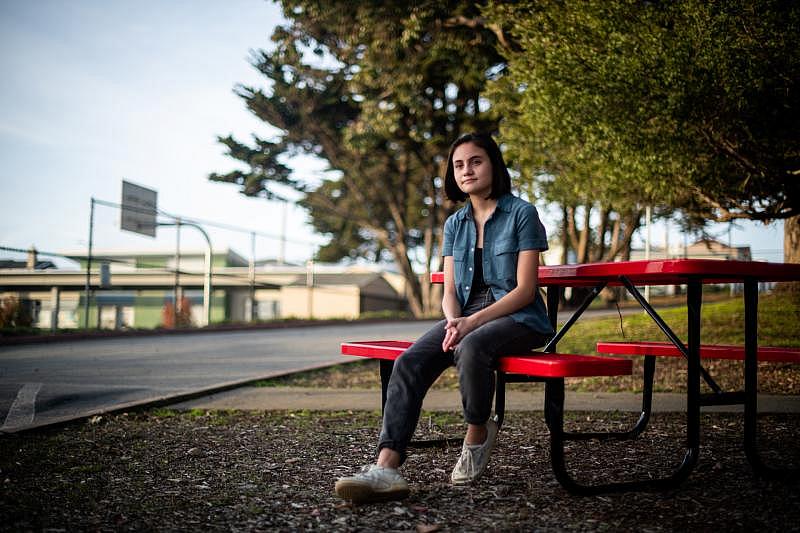
Justine Orgel poses for a portrait at Lowell High School in San Francisco on Jan. 9, 2020. (Beth LaBerge/KQED)
But many of those allegations, Orgel acknowledged, were outside the school district’s ability to address. Some concerned alleged off-campus assaults, and most emails to the district about these incidents were sent by people without firsthand knowledge of the alleged incidents, according to Dudnick.
“It sucks to say this, but there's very little the school districts can do,” Orgel said. “But I want structural change. I want people to find peace, and I want them to have faith that their communities believe them.”
Orgel posted the email template on her Instagram page so that other students could email it to administrators as well. Then she went to sleep, waking up a few hours later to a barrage of messages.
“My Instagram was just super flooded,” Orgel said. She’d received hundreds of messages of thanks. “I'm the type of person where I hate not getting something done, especially when someone is counting on me. I just felt like such a sense of urgency.”
Over the summer, Lowell Principal Swett sent an email to students that outlined steps the school had taken to educate and prevent sexual harassment on campus, such as awareness campaigns, training for teachers and programs to educate students about healthy relationships.
“I wish that I had as much power as kids think I have,” Swett said. “I am very sorry that anyone has ever been hurt. It’s not fair, and we do our best to try to mitigate all of that. I have spent a tremendous amount of my time simply responding to people’s bad behavior.”
Finding Support Online
Even if the school district is unable to do anything about it, some students say sharing their stories and finding support online has helped them in other ways. Xufei Zhao, who graduated from Galileo Academy of Science and Technology in San Francisco last spring, said a few years ago she was sexually assaulted by a family member, a student at Lowell High School. She had no idea what to do.
“When it happened, a lot was going on in my mind. I was like, what do I do? Am I supposed to talk to him first? Am I supposed to tell my parents? Am I supposed to file a report? Am I supposed to ... hide it from everybody until I die?” she said, remembering the shame she felt at the time. She bought a lock for her bedroom door so she could hide when the relative came over for family gatherings.

Xufei Zhao, a recent graduate of the Galileo Academy of Science and Technology high school in San Francisco, says it felt like a weight had been lifted after she posted about her experience of assault online. (Courtesy of Xufei Zhao)
KQED is unable to verify the allegations and is not naming the alleged perpetrator. He did not respond to requests for comment.
After Zhao posted about her experience online, she opened up to her parents about the alleged abuse, and was put in touch with a hotline for sexual assault survivors. San Francisco police reached out to her on Instagram, and she considered filing a police report. But she says she decided against it because she already felt drained, and was skeptical filing a report would lead to a conviction.
When Teachers Are Accused
But the school district did complete at least two investigations against Lowell teachers after allegations were posted on social media, according to disciplinary documents provided to KQED in response to a public records request.
Physical education teacher Thomas Geren was accused last summer of demonstrating patterns of inappropriate behavior, including unwelcome touching, staring and catcalling.
The school found that Geren had used terms of endearment to describe students, pointed out a student’s hickies and “touched a student’s shoulders in what was an unwelcome gesture,” according to a counselling memo. Principal Swett directed Geren to refrain from physical contact with students and familiarize himself with district policies and employee codes of conduct.
Geren and his attorney did not comment on the allegations or the discipline.
In a separate case, a student posted allegations of harassment against social studies teacher Adam Michels on Instagram in June. She wrote that she had reported his behavior during the school year.
“I received radio silence the moment my classes were switched, with no idea if this man even knew what he did was wrong,” the student, who declined to be interviewed, wrote in the post. “Please listen to me. A class and subject that I was so eagerly looking forward to taking has been tainted and ruined for me. I don't want that for anybody else.”
Others had also reported Michels to administrators before the post went up, according to a memorandum written by school officials in December 2019. An unnamed colleague had complained that Michels made her uncomfortable and affected her ability to work in the same classroom as him. An unspecified number of students also complained about the teacher’s behavior that fall, which they alleged ranged from sarcasm to intimidation, condescending remarks and use of sexual innuendo, according to the memo.
Michels “appeared responsive” according to the December 2019 memo, which says he received a verbal reprimand. But less than a year later, he would again face discipline for similar behavior.
In an Aug. 11, 2020 interview with administrators, Michels admitted to following several of his current students on social media, according to a follow-up disciplinary memo. He also tried to contact a student who’d posted about him via social media through another student, despite being directed not to do so. He’d used a picture of a student in his class without permission, unnecessarily touched students, teased them and made unwelcome comments about a student’s appearance, according to the memo. This time, Michels received a written reprimand.
Over two phone interviews and a series of emails, Michels denied ever harassing or inappropriately touching students. He said he had used students’ photos in presentations for years without any complaints until the last school year.
He said he now has a good working relationship with the colleague who complained, which he said stemmed from a dispute over music. He also said the school should have told the student who turned to Instagram over the summer the outcome of her original complaint.
“She felt like she wasn't heard by me or the administration, that it had just been swept under the rug, and it’s not true,” Michels said. “I almost feel as though the whole post could have been avoided if there had been some process where she felt some completion or resolution.”
What I hear in young people going to social media to tell their stories is that the system has failed them, that they don't see it as a system that's going to support them.
Emma Mayerson, executive director of Oakland-based Alliance for Girls
Principal Swett said the school was able to inform the student her concerns had been addressed after Michels’ inappropriate behavior had continued.
After seeing the Instagram post, an alum who graduated in 2015 wrote in a testimony for the district’s investigation that Michels also harassed her in class and online. She included embedded screenshots in the testimony, which she shared with KQED, that show Michels complimenting her appearance and expressing doubt about her intellect.
She said he told her she did not fit the stereotype of Asian girls at Lowell.
“Throughout ... my studies, I felt a constant pressure to defy norms imposed on Asian women and prove the worthiness of my accomplishments,” the student wrote in the testimony. She asked not to be named over concerns being identified could put her career at risk or lead to retaliation by the teacher.
Michels said he could not remember making the comments, which he said may be taken out of context, and that referencing a stereotype does not mean he believes it to be true. He said he would usually only message a student online if they were teaching assistants or if they had already graduated.
After he was interviewed for this story, Michels sent over a dozen emails describing the reprimand as unfair to him and criticizing so-called cancel culture and what he called “a culture of heightened sensitivity."
In an interview, Principal Swett said it was very clear to her that Michels had violated professional conduct standards.
“I'm a little concerned that your article might spread the falsehood that I sexually harass students in class. I do not,” Michels wrote in one email in November. “Even presenting the story as if it is an open question is completely unfair. I don't meet with students outside of class. I compliment students and I tease them sometimes, but it is in front of 35 other students, and I have never sexually harassed anyone.”
Three Lowell students and alumni told KQED that while they enjoyed his class and thought Michels did not intend to cause harm, they could also understand how some would find his sense of humor inappropriate. One said they never saw Michels inappropriately touch anyone. Another student described him as a “very professional” teacher.
The alum who testified against Michels said she was disappointed in the outcome.
“The outcome that happened was absolutely disheartening,” she said. “It's just so hard. These systems protect perpetrators more than they ever will victims. I'm emotionally exhausted.”
Julie Chang and Teresa Cotsirilos contributed to this report.
This article was produced as a project for the USC Annenberg Center for Health Journalism Impact Fund.

